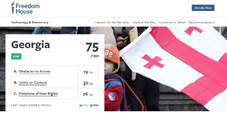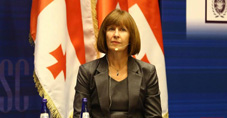
Georgia is in top ten of Internet Freedom Index 2019
By Tsotne Pataraia
Thursday, November 7
Following “Freedom House” research, Georgia ranks 10th in the world in Internet Freedom Index in 2019 and holds 10th place with Italy having 75 points. According to the organization, during the reporting period, internet freedom in Georgia was fully protected. In terms of Internet freedom, Georgia is ahead of developed countries such as Japan (73 points) and Hungary (72 points) and ranks next to countries such as France, Great Britain, USA, Germany, Australia, Canada, Estonia, and Iceland. Georgia was awarded a score of 75 out of 100 and a status "free."
As “Freedom House” writes the government generally respected digital rights protection in Georgia - a new constitution was enacted that guarantees the right to use the internet:
“During the reporting period, the government generally respected and protected digital rights. At the same time, a new constitution came into force that guarantees access to the Internet,” reads the report.
However, as “Freedom House” points out, there are a few problems yet to be solved. Threats to internet freedom on many fronts still continue, although access to the internet has increased, growth has been slow. The organization talks about the problem of government trolling:
“Internet freedom was threatened in at least some areas. Access increased, but growth was weak. Trolling, especially on the part of government-affiliated bots, has grown especially in June 2018 and during the 2018 presidential election. In addition, the Internet landscape is also marred by noisy cases of harassment and oppression during the reporting period,” reads the report.
“Freedom House” research focuses on a number of specific events, including the 2018 presidential election, where the authors estimate that anonymous actors distorted the internet landscape with widespread misinformation on social media:
“Election observers found that during the 2018 presidential election campaign, both the ruling party and the opposition were conducting misinformation and trolling campaign. A report by the International Society for Fair Elections and Democracy (ISFED) says that sponsored posts were revealed on various anonymous Facebook pages, which were used to discredit both candidates," writes Freedom House.
The report says Georgia regularly holds competitive elections, and the country's democratic trajectory has shown signs of improvement in 2012-2013, during a period of governmental rotation, yet progress has been slow:
“Progress in democratic development has stopped in recent years. Oligarchic actors have a huge influence on politics and political choices, and the rule of law is still hampered by political interests,” reads the report.
The report also addressed the issue of dissemination of personal privacy records and cyberattacks on “TBC Bank.”
Acting Ambassador of the United States to Georgia Elizabeth Rudd responded to the report. She said that the United States strongly supports strengthening media freedom in Georgia:
Freedom House is a private organization that makes its own independent assessment of the situation in the countries. All I can say is that the US strongly supports the strengthening of media freedom in Georgia, which is the foundation of a democratic society, "said Elizabeth Rudd.
The Chairman of the Parliament of Georgia also commented on this issue. Archil Talakvadze noted that researches, reports, and evaluations of international organisations are interesting and worthy of authorities' attention, although he pointed out, the assessment of trolls and misinformation in the study was excessive and partially devoid of realistic basis:
“Misinformation in our country is often used against state interests. I think that the thematic inquiry that the Parliament is making in this direction will provide very important assessments to the public,” said Talakvadze.
Iceland ranks first in internet freedom, Estonia in second, and Canada in third. The top ten also includes Germany, Australia, the UK, the US, France, and Armenia. The index is defined every year by the “Freedom House.”


